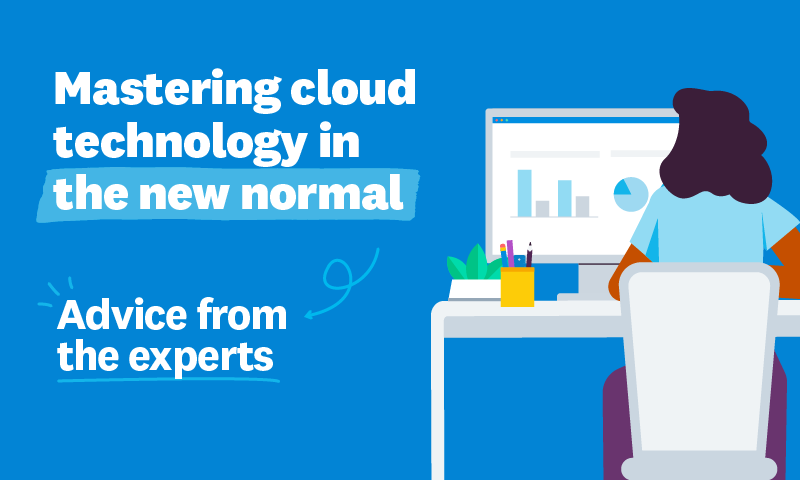
Amid the challenges of the past several months, it has been incredible to watch everyone step up to support each other as we all begin to get a grasp on the new normal. Accountants and bookkeepers have truly gone above and beyond expectations when it comes to supporting and advising their clients. This demonstrates the industry’s incredible adaptability, even under challenging circumstances.
Firms have embraced change by moving online, digitising operations, embracing remote work, and adopting new tools for client engagement. The adoption of cloud accounting over the past few years has continued – and perhaps further accelerated – during the coronavirus crisis.
We recently hosted a live panel session with three accounting experts to discuss how they’ve mastered cloud technology and the ways it’s benefitted their practice during the last few months.
Here are some of the key takeaways from the session. You can watch the full panel discussion on the recording below, or download our dedicated guide which is packed full of tips and tools to help you master cloud technology in your practice.
Taking the leap
The first step to effectively moving your firm and clients to the cloud is convincing all stakeholders that it’s worthwhile. Adam Fernandes, Director at the Cloud Accountant, said that his firm has had cloud culture ingrained from the start. However, new clients that had only used traditional practices in the past were often hesitant. He found that explaining the reasoning for choosing a cloud-based platform and the immediate benefits the client will see are the best ways to convince reluctant clients.
Sheetal Shah, Partner at DSK Partners LLP, agreed. Sheetal acknowledges that digitisation can be a big, potentially stressful step for clients. So at DSK Partners LLP they ensure they are there every step of the way to guide their clients through the process.
Clare Elsby, Head of Marketing and Business Development at Elsby & Co, experienced a similar phenomenon internally. When Elsby & Co took over a practice a few years ago, they found that it was based on very traditional systems. Clare explained that “many of the employees were not comfortable with the technologies we used, and as a result, either left or retired. However, others have completely embraced it, and these times have accelerated”. Elsby & Co’s migration to the cloud took about six months, and some clients still insist on paper, but GDPR, MTD, and now COVID-19, have further strengthened the case for cloud accounting.
Using technology to stay productive
Sheetal said that while nothing could have prepared DSK Partners LLP for the pandemic mentally, their technology offered a firm grounding. Many employees had concerns over how the business would operate without face to face interaction, and most missed seeing one another in the office. However, the company quickly discovered that “the key was creating a culture that boosts motivation and encourages interaction online”. DSK Partners LLP implemented a ‘buddy system’ on Microsoft Teams and continued having ‘staff away days’ – events from quizzes to essential training – virtually.
For Clare and the rest of Elsby & Co, the adjustment to working from home was a significant challenge as just 20 percent of staff had previously made use of their flexible working policy. “The first week was pretty scary,” she said, “but our only major challenge was our phone landlines and using Microsoft Teams quickly solved that”. Elsby & Co also created various virtual teams that corresponded to their organisation in the office and ensured that everyone was kept updated through her weekly ‘Wednesday wisdoms’.
When it comes to cloud tools, Sheetal, Adam, and Clare all have their favourites. All three agreed that Receipt Bank was an essential tool – Sheetal said that 10% of clients weren’t using a digital system at the start of the pandemic, so the firm gave them Receipt Bank for free to help them out. He also found that WorkflowMax was essential to juggling projects while working remotely. Adam agreed, adding recommendations for Calendly, Xero Tax and Spotlight.
Moving forward
Businesses are still recovering, and there are likely significant challenges ahead. Adam reports that his clients’ primary concern is cash flow. He anticipates some pain at the beginning of next year and urges proper cash flow forecasting as a remedy. Clare said that, although cloud technology is clearly the way of the future, it’s important that training isn’t neglected in the rush to move online. She said that the challenge for Elsby & Co would be finding staff that are equally skilled in both the fundamentals of accounting and the cloud.
As we settle into our new reality, businesses and their accountants and bookkeepers will continue to benefit from cloud technology. It will play a vital role in the recovery, allowing accountants and bookkeepers to continue to support clients no matter what.
Download our dedicated guide to mastering cloud technology. It will help you understand the benefits of cloud technology and how to get the most out of it.
Visit our dedicated site for more resources, webinars and inspirational stories to help you navigate the COVID-19 pandemic.
Leave a Reply